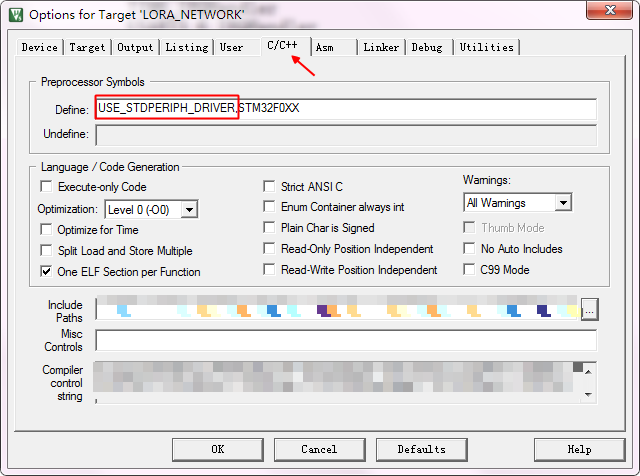assert |
您所在的位置:网站首页 › illegal param是什么意思 › assert |
assert
|
assert_param函数的用法
在STM32的固件库和提供的例程中,到处都可以见到assert_param()的使用。如果打开任何一个例程中的stm32f10x_conf.h文件,就可以看到实际上assert_param是一个宏定义; 在固件库中,它的作用就是检测传递给函数的参数是否是有效的参数。 举例说明: assert_param(IS_USART_ALL_PERIPH(USARTx)); 这句代码用于检查参数USARTx是否有效,其中IS_USART_ALL_PERIPH(USARTx)是一个宏定义,如下: #define IS_USART_ALL_PERIPH(PERIPH) (((PERIPH) == USART1) || \ ((PERIPH) == USART2) || \ ((PERIPH) == USART3) || \ ((PERIPH) == USART4) || \ ((PERIPH) == USART5) || \ ((PERIPH) == USART6) || \ ((PERIPH) == USART7) || \ ((PERIPH) == USART8))
宏定义的功能是参数USARTx是USART1~USART8其中的一个,表示参数USARTx有效,返回true,否则返回false。 assert_param()也是一个宏,定义在stm32f0xx_conf.h中,具体如下: /* #define USE_FULL_ASSERT 1 */ /* Exported macro ------------------------------------------------------------*/ #ifdef USE_FULL_ASSERT /** * @brief The assert_param macro is used for function's parameters check. * @param expr: If expr is false, it calls assert_failed function which reports * the name of the source file and the source line number of the call * that failed. If expr is true, it returns no value. * @retval None */ #define assert_param(expr) ((expr) ? (void)0 : assert_failed((uint8_t *)__FILE__, __LINE__)) /* Exported functions ------------------------------------------------------- */ void assert_failed(uint8_t* file, uint32_t line); #else #define assert_param(expr) ((void)0) #endif /* USE_FULL_ASSERT */
如果USE_FULL_ASSERT宏定义了,则执行下面的代码: #define assert_param(expr) ((expr) ? (void)0 : assert_failed((uint8_t *)__FILE__, __LINE__)) //表示参数expr为false,则执行后面的assert_failed()函数,__FILE__, __LINE__是标准库函数中的宏定义,表示文件名和行号 void assert_failed(uint8_t* file, uint32_t line); //申明该函数如果USE_FULL_ASSERT没有宏定义,则执行((void)0),即什么都不做。
assert_failed()函数的具体实现在main.c中(在任何一个例程中的main.c中都有这个函数的模板),内容如下: 1 #ifdef USE_FULL_ASSERT 2 3 /** 4 * @brief Reports the name of the source file and the source line number 5 * where the assert_param error has occurred. 6 * @param file: pointer to the source file name 7 * @param line: assert_param error line source number 8 * @retval None 9 */ 10 void assert_failed(uint8_t* file, uint32_t line) 11 { 12 /* User can add his own implementation to report the file name and line number, 13 ex: printf("Wrong parameters value: file %s on line %d\r\n", file, line) */ 14 15 /* Infinite loop */ 16 while (1) 17 { 18 } 19 } 20 #endif
assert_failed()函数给了一个框架,内部具体实现需要开发者自己去写,通常是用串口把文件名和行号打印出来。
要使assert_failed()函数生效,需要宏定义USE_FULL_ASSERT,并且包含头文件stm32f0xx_conf.h;在stm32f0xx.h文件中,有如下代码: #ifdef USE_STDPERIPH_DRIVER #include "stm32f0xx_conf.h" #endif只要宏定义USE_STDPERIPH_DRIVER,就能包含头文件stm32f0xx_conf.h了。 宏定义可以在文件中写,也可以直接在软件中设置,如下图:
注意:assert_failed()函数一般在代码调试时使用,可以帮助开发者检查输入参数无效的错误,但由于assert_failed()函数会影响代码执行效率,在程序release时,需要屏蔽掉,将宏定义USE_FULL_ASSERT注释即可。 |
【本文地址】
今日新闻 |
推荐新闻 |
